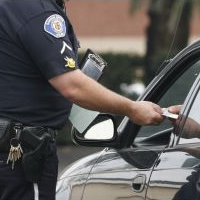State Ends “Pay-to-Play” Court Access for Traffic Fines, but Bloated Charges Remain
 Police officer issues a citation in Santa Ana (photo: Joshua Sudock, Orange County Register)
Police officer issues a citation in Santa Ana (photo: Joshua Sudock, Orange County Register)
California drivers will no longer have to pay traffic fines (under the guise of bail) before arguing their case in court, but they will still be subjected to fees and surcharges that can, and do, turn a $100 fine into $549.
The California Judicial Council, the administrative arm of the judiciary led by Supreme Court Chief Justice Tani Cantil-Sakauye, voted unanimously Monday to reverse the long-standing “pay-to-play” option that effectively barred many lower-income drivers from contesting a ticket in a lot of county courts. The chief justice proposed the change three weeks ago.
The “emergency” action was taken in response to a public uproar over the widespread use of traffic fines and attached secondary fees to fund basic court functions. Many of the Superior Courts regard the charges as budgetary necessities in light of massive cutbacks by the state and mismanagement of the judiciary’s limited resources.
That isn’t changing. They will continue.
“This is an important first step to address an urgent access-to-justice issue,” Cantil-Sakauye reportedly said Monday. “More work lies ahead.”
The American Civil Liberties Union (ACLU) of Northern California sent letters in April to several Superior Courts, including the one in Fresno County, warning them that demanding payment of a fine upfront, even if they call it “bail,” is not authorized by Vehicle Code section 40519, as they claim. That only applies to people who wish to be arraigned and tried on the same day.
The policy “creates two classes of people,” the ACLU wrote, “those who can pay to access the courts in a traffic infraction and those who cannot.”
Getting rid of the dubious, unconstitutional practice of charging people for due process will probably have a limited effect on the 4 million California drivers who have had their licenses suspended in the last eight years for not paying what started out as minor traffic violations. It is safe to say that few of the people were well-off financially.
Last year, a report from the independent state Legislative Analyst’s Office (LAO) said court-ordered unpaid debt now tops $10.2 billion. The LAO suggested getting money by grabbing folks before they left the courthouse, to set up a payment plan; have better communication with debtors; and create more efficient tools for restructuring debt.
State Senator Bob Hertzberg (D-Los Angeles) took another tack. He introduced Senate Bill 405 in April, which offers limited amnesty to offenders. It would let low-income drivers who ran afoul of the law before 2013 get their licenses back by paying a portion of their original fine. No criminal action would be taken against participants. The bill passed the Senate on a 39-1 vote June 2.
The new Judicial Council rule lets the upfront payment slide, but does not prevent the cascade of additional penalties to accrue, and immediate payment demanded, if the driver misses the initial hearing. That is a sore spot with critics, who note that people can miss an appointment because of emergencies, misdirected notices, problems finding and getting to the proper courthouse, and other exigencies.
An already-overburdened criminal justice system is almost certain to immediately become busier. Judges and cops are worried that already-crowded dockets will be deluged by people wanting to fight their tickets. There is also a fear that some will be trying to game the system, gambling that the officer won’t be able to appear and the ticket will be tossed.
But much more pain will almost certainly be felt by ticketed motorists, still saddled with bloated, unfair fines.
A report (pdf) cited by Chief Justice Cantil-Sakauye, “Not Just a Ferguson Problem―How Traffic Courts Drive Inequality in California,” recommends that fees be reduced by 50% and courts take into account someone’s ability to pay while considering community service options.
But that loss of revenue might rely on the state restoring more of the billion dollars in budgetary cuts—suffered during and after the Great Recession—than Governor Jerry Brown allocated in his proposed 2015-16 budget.
–Ken Broder
To Learn More:
CA Judges Drop Pay-First Rule for Fighting Traffic Tickets (by Maria Dinzeo, Courthouse News Service)
Californians Can Now Contest Traffic Tickets Without Paying (by Christopher Cadelago, Sacramento Bee)
California Changes Rules on Traffic Ticket Fines (by Josh Richman, San Jose Mercury News)
People Can Fight Traffic Tickets Without Paying Fine First, Judicial Council Says (by Maura Dolan, Los Angeles Times)
Why a $100 California Traffic Fine Ends up Costing $549 (by Ken Broder, AllGov California)
California Welcomes 200,000 New Immigrant Drivers into System that Annually Suspends Half a Million Licenses (by Ken Broder, AllGov California)
Not Just a Ferguson Problem―How Traffic Courts Drive Inequality in California (Lawyer's Committee for Civil Rights) (pdf)
- Top Stories
- Controversies
- Where is the Money Going?
- California and the Nation
- Appointments and Resignations
- Unusual News
- Latest News
- California Forbids U.S. Immigration Agents from Pretending to be Police
- California Lawmakers Urged to Strip “Self-Dealing” Tax Board of Its Duties
- Big Oil’s Grip on California
- Santa Cruz Police See Homeland Security Betrayal in Use of Gang Roundup as Cover for Immigration Raid
- Oil Companies Face Deadline to Stop Polluting California Groundwater





